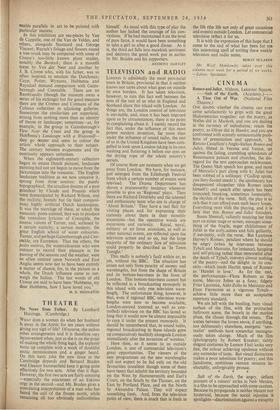TELEVISION and RADIO LONDON is admittedly the most provincial town
in Britain, provincial in that it neither knows nor cares about what goes on outside its own borders. It has taken television, however, to ram this fact well between the eyes of the rest of us who in England and Scotland share this island with London. As things arc, the London control of television is inevitable, and, since it has been imposed upon us by circumstances, there is no point in complaining about it. I merely record the fact that, under the influence of this most potent modern invention, far more than under the influence of sound radio, the rest of us in the United Kingdom have been com- pelled to look upon London taking in its own washing and fluttering it before our eyes on the drying rope of the whole country's aerials.
Of course there are moments when we get away from London. We have, for instance, just emerged from the Edinburgh Festival from which a certain number of events were televised. The Drama Department has shown a praiseworthy tendency whenever possible to give us 'Regional' plays. Then there are Richard Dimbleby and the talented and enthusiastic team who are in charge of `About Britain.' They have a real flair for visiting places, and for expressing their curiosity about them in their monthly excursions—but the operative words are excursions and curiosity. Royal, naval, military or air force occasions, as well as other national events, are reflected upon the television screen and so on, but the large majority of the ordinary fare of television could properly be described as 'In Town Tonight.'
This really is nobody's fault within or, as yet, without the BBC. The situation has arisen not only from paucity of money and wavelengths, but from the shape of Britain and its bottom-heaviness in the form of London. This bottom-heaviness cannot but be reflected in a broadcasting monopoly in this island with only one television wave- length. The unfortunate thing, however, is that, even if regional BBC television wave- lengths were now to become available, London-centred (centred as well as con- trolled) television on the BBC has lasted so long that it would now be almost impossible to cure it under the present monopoly. It should be remembered that, in sound radio, regional broadcasting in these islands grew up comparatively healthily alongside London immediately after the invention of 'wireless.'
Here then, so it seems to us outside London, is one of commercial television's great opportunities. The viewers of the new programmes on the new wavelengths will not expect to be fed only on the old avourities (excellent though some of them have been) that inhabit the territory bounded on the West by Hammersmith and Earl's Court, on the South by the Thames, on the East by Portland Place, and on the North by Alexandra Palace. They will expect something fresh. And, from the television point of view, there is much that is fresh in the life (the life not only of great occasions and events) outside London. Let commercial television reflect it for us.
It is with the expression of this hope that I come to the end of what has been for me this interesting spell of writing these weekly television and radio notes.
MORAY MCLAREN
Mr. Wolf Mankowitz takes over this column next week for a period of six weeks. —Editor, Spectator.


































 Previous page
Previous page